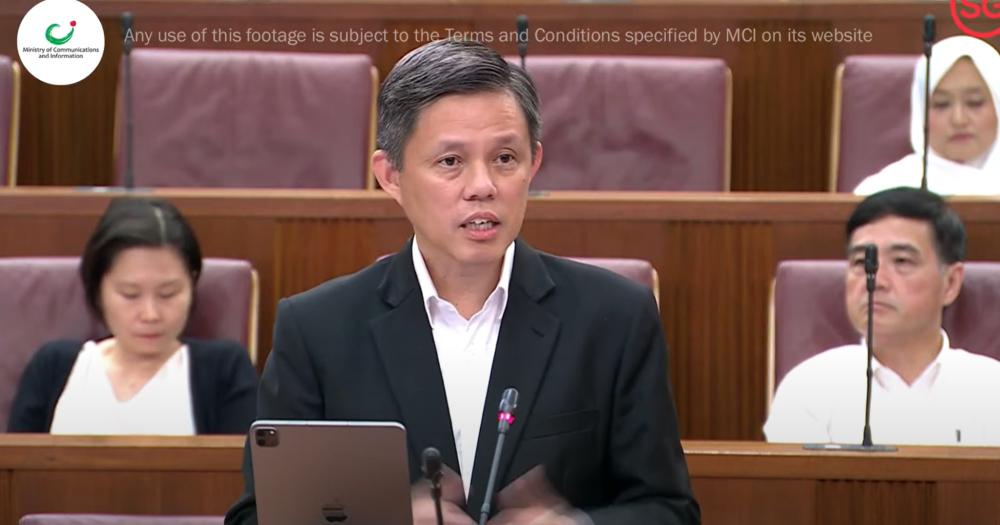Education Minister Chan Chun Sing said in parliament on Mar. 4 in the wake of the controversy over the Character and Citizenship Education (CCE) lessons, in relation to the ongoing Israel-Hamas conflict.
Throughout his speech, he noted the worries and concerns that had been brought up by parents, students, and teachers, as well as stating the intent of the CCE lessons, and its necessary role in maintaining Singapore's ongoing social cohesion and harmony.
Slide shows
In recent weeks, a cherry-picking of slides used in Ministry of Education (MOE) CCE lessons to teach students were circulated on social media.
Some members of the public expressed concerns that the slides revealed an inherent bias towards one side or the other in the ongoing Israel-Hamas conflict.
Chan rejected this characterisation of the slides, saying: “CCE is an established and integral part of the holistic education we provide to all our students.”
He defended the lessons and the teachers who had chosen to step up, despite any initial hesitations, taking on the challenge of teaching a difficult subject and carrying out their duties professionally.
However, he also emphasised that it was understandable for some teachers to have hesitations over carrying out the lessons, and might have reasonably chosen to be excused from conducting them, and were subsequently supported by their school leaders.
Chan said the MOE was fully committed to equipping its teachers to help students better navigate a complex world, and would improve its teaching methods based on experiences gained.
Lesson's intentions
Chan also emphasised that the CCE lesson was not meant to teach the entire historical context, and it was not to teach the history of the Israel-Palestine conflict, or Middle Eastern politics.
He said: “It is impossible to do so in an hour-long session, and it was never our intention in the first place.”
Chan said the focus was on teaching younger students to express sympathy and empathy with others, as well as managing their emotions regarding the conflict.
Older students were to be taught to be more discerning of different sources of information.
Lesson plans
Chan laid out four learning lessons that the MOE had taken from the recent episode.
Misrepresentation
First, it could not be underestimated the damage that misrepresentation could cause.
Chan cited one example of online commentators picking out a single slide from the MOE lesson deck and asserting that schools were telling students the situation in Israel and Gaza only started on Oct. 7.
The insinuation was that the MOE was pro Israel, and was characterising one side as the aggressor and the other side as the victim.
Chan rejected this interpretation, saying that while the insinuation riled many up, the slide simply indicated events that had occurred since Oct. 7.
The MOE had also provided background material on historical developments behind the conflict that could be shared with students who wished for more information.
Chan called it a sobering reminder that it was not always easy to separate those with well-meaning intentions from those with ulterior intent to “stir up negative emotions on an already sensitive topic”.
Work in progress
Secondly, managing differences respectfully was still a work in progress.
While Singaporeans largely express their views in a civil and respectful way, the episode showed that this could not be taken for granted
Chan revealed that some teachers has faced online vitriol and anger, with one educator’s picture being shared online with disparaging captions, including racial slurs, and with the intention of making the picture go viral.
Chan said all instances of abuse, harassment, or threats against educators would be investigated, and that the educators had MOE's full support and the full protection of the law.
He also said that while disagreements on issues were to be expected, personal attacks and racial slurs could not be condoned, saying “We have to be positive role models for our children”.
External interference
Third, Singapore had to be very watchful for potential external interference.
Chan said that some external online parties have taken an active interest in Singaporean discussions, with some showing no hesitation to join in to incite anger and unhappiness.
Singapore had to be careful to not “fall prey to their attempts to roll up our people and undermine our cohesion”, Chan said.
Sustained commitment and effort
Fourth, Singapore's unity depends on sustained commitment and effort.
Chan and second minister Maliki Osman had spoken to over 300 school principals to get their feedback on the subject, having previously done so in January.
The principals shared their feedback and the challenges they had encountered, prompting the question of whether to continue with the CCE lessons.
Chan said many principals shared that they would not have discharged their duties as educators if people became more divided, and viewed each other with more suspicion, or became unable to manage differences and diversity with respect and sensitivity.
That prompted a difficult question, Chan said: “If not us, who? If not now, when?”
He added that he drew comfort from their conviction.
Convictions
Chan thanked principals and teachers for standing firm by their convictions despite the challenges in the diversity of their beliefs, as well as extending his gratitude to all who had given feedback.
Chan emphasised that the CCE lessons were a work in progress, and the MOE was fully committed to improvement.
He assured teachers and principals that they had his full support, and hoped that other MPs and the public would do so as well.
Related stories
Top image via Ministry of Communications and Information/YouTube

If you like what you read, follow us on Facebook, Instagram, Twitter and Telegram to get the latest updates.



